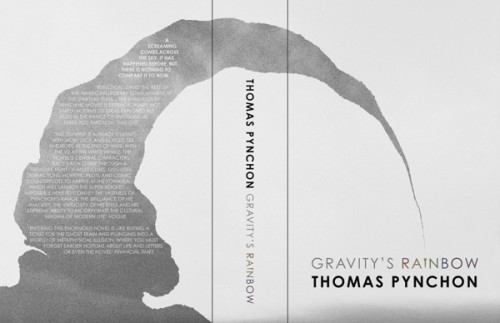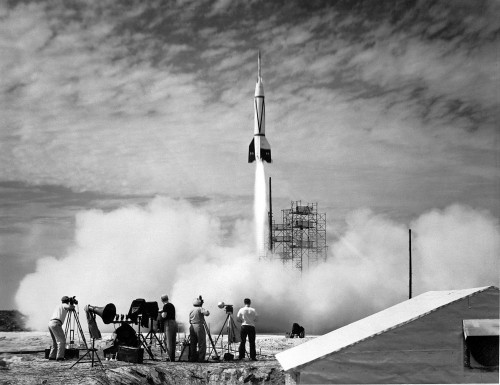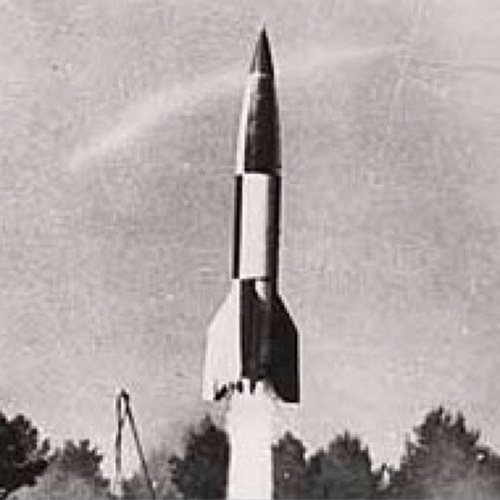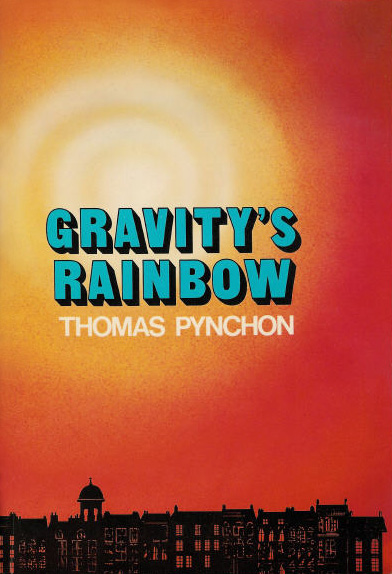 The prime system of death, the Rocket Bomb, hangs over all of us, and if Pynchon were writing this book today he would recognize its progeny too, the suitcase or backpack variation, the shipping container gambit, the car or truck packed with wired, uranium laced bundles. All the systems that so choke our individual spirits and humanity — the numberless agencies, the technologies, the quantity of dark networks and automatic spies, the remorseless, coldblooded capitalism that dismisses borders, nationalities, individuals, and love all for the sake of markets and profits, the information-industrial complexes in deserts and camouflaged in office parks, these kingdoms of data and dossiers, all of these anti-human, death-loving structures came to birth in WW I and reached their vigorous youth in WW II: so says Thomas Pynchon in Gravity’s Rainbow, a profound, exasperating 760 page American novel about a search for the German V2 rocket, its secrets and its messages.
The prime system of death, the Rocket Bomb, hangs over all of us, and if Pynchon were writing this book today he would recognize its progeny too, the suitcase or backpack variation, the shipping container gambit, the car or truck packed with wired, uranium laced bundles. All the systems that so choke our individual spirits and humanity — the numberless agencies, the technologies, the quantity of dark networks and automatic spies, the remorseless, coldblooded capitalism that dismisses borders, nationalities, individuals, and love all for the sake of markets and profits, the information-industrial complexes in deserts and camouflaged in office parks, these kingdoms of data and dossiers, all of these anti-human, death-loving structures came to birth in WW I and reached their vigorous youth in WW II: so says Thomas Pynchon in Gravity’s Rainbow, a profound, exasperating 760 page American novel about a search for the German V2 rocket, its secrets and its messages.
These systems are ubiquitous, and as envisioned by Pynchon, wholly malign. They are engines of annihilation: “All the animals, the plants, the minerals, even other kinds of men, are being broken and reassembled every day” — their goal is to “preserve an elite few”; They use “every other form of life without mercy (230).”
To guide us, Pynchon reimagines an 18th Century narrative voice, something similar to the master voice of a novel like Tom Jones — an intimate, familiar, intrusive voice. He refreshes it in the 20th Century epoch of horrors and absurdities. He makes it the punk cousin of that 18th Century voice — raunchy, comedic, and especially slippery, with shadings into continual shifts in points-of-view.
 The plot of Rainbow spreads, flood-like. It fills every piece of flat narrative ground and within it all manner of plotlines and settings arise, like trees and briers extending above the waters. Every kind of wreckage and offal surges past. The reader is often caught in the swell and sheer speed of the stories and for pages can lose his way. Pynchon’s imagination is both breathtaking and paralyzing in its range and inventive power. He knows about rocket design, the make-up of various fuels, guidance systems, statistical analysis, behaviorism, the 1904 German war of enslavement against the Herero peoples of south-west Africa, the terrible chaos of northern Europe and Germany at the end of WW II, inorganic chemistry and the creation of plastics, Nordic myth, every kind of drug, every kind of sexual deviance, the details of how giant corporations worked both sides of the European war — the Allied and the German. He knows how to write songs and limericks. He could navigate the coastline of the Baltic Sea. He knows how government operations compete for resources and sabotage each other in doing so. I have not listed even a quarter of the sectors of knowledge that he incorporates into this book.
The plot of Rainbow spreads, flood-like. It fills every piece of flat narrative ground and within it all manner of plotlines and settings arise, like trees and briers extending above the waters. Every kind of wreckage and offal surges past. The reader is often caught in the swell and sheer speed of the stories and for pages can lose his way. Pynchon’s imagination is both breathtaking and paralyzing in its range and inventive power. He knows about rocket design, the make-up of various fuels, guidance systems, statistical analysis, behaviorism, the 1904 German war of enslavement against the Herero peoples of south-west Africa, the terrible chaos of northern Europe and Germany at the end of WW II, inorganic chemistry and the creation of plastics, Nordic myth, every kind of drug, every kind of sexual deviance, the details of how giant corporations worked both sides of the European war — the Allied and the German. He knows how to write songs and limericks. He could navigate the coastline of the Baltic Sea. He knows how government operations compete for resources and sabotage each other in doing so. I have not listed even a quarter of the sectors of knowledge that he incorporates into this book.
In the clearest thread of action, we follow Tyrone Slothrop who works for ACHTUNG, one of the many secret organizations Pynchon names. He has been sent to Europe as the war ends to find the Rocket 00000, the last of the V2’s (although 00001 waits at the end of the novel to carry a terrible payload to us). He has been manipulated since he was a child by behavioral scientists and is tracked throughout the wildness of a destroyed Germany by other powers who want to discover his secret — he knows where V2’s will fall — which is quite a trick since on their descent they travel faster than the speed of sound, more than a mile a minute, and the clamor of their explosion is followed by the sound of their falling. They are the first kind of technological mass death delivered without sound. The locations of his sexual trysts match the impact points of the rocket blasts. In some preternatural manner, his body picks up the signals from the V2s.
 As would be expected in a portrayal of a demented, farcical and deadly War Zone, both supervised by some nebulous “they” and disrupted by chaos, most of the characters are flat and cartoonish including, up to a point, Slothrop (who eventually dissolves — no other verb does justice to his exit). One of the struggles in this Zone is how to retain any space at all to be a human being and not a tool or an economic unit or bits in an information flow. Pynchon offers only a slim hope of this: “Just as there are in the World machineries committed to injustice as an enterprise, so too there seem to be provisions active for balancing things out once in a while. Not as an enterprise, exactly, but at least in the dance of things (580).” As evidenced by the characters, paranoia is the most apt response to this new world.
As would be expected in a portrayal of a demented, farcical and deadly War Zone, both supervised by some nebulous “they” and disrupted by chaos, most of the characters are flat and cartoonish including, up to a point, Slothrop (who eventually dissolves — no other verb does justice to his exit). One of the struggles in this Zone is how to retain any space at all to be a human being and not a tool or an economic unit or bits in an information flow. Pynchon offers only a slim hope of this: “Just as there are in the World machineries committed to injustice as an enterprise, so too there seem to be provisions active for balancing things out once in a while. Not as an enterprise, exactly, but at least in the dance of things (580).” As evidenced by the characters, paranoia is the most apt response to this new world.
Pynchon causes the reader to go beyond the familiar story of our war with Germany — the Greatest Generation rising to the challenge and paying the cost of existential conflict. He seems to believe that the technological evolution of the War, its mammoth size and therefore its necessary scale of organization connected with the awful reality of what we were fighting — a genocidal, racist state led by fanatics and their enormous, superbly armed and trained army. That combination produced something that 19th century colonization and WW I had begun — a meta-state composed of international corporations and their needs and nation states and their capacity for force. Within this new reality individual human beings are squashed by their confluence and reduced to appetites and to brutal or absurd demands. Their purpose is to be consumed.
The characters lose their three-dimensionality due to the effects of the War and the systems that immerse them. The only force that gives them shape, that brings them close to depth of personality and range of emotion is love. Even Blicero/Weissman, the Rocket engineer of the 00000, a pedophile and a killer, acquires an awful wholeness because he feels a perverse kind of love, but Roger Mexico, a statistician plotting the V2 explosion sites, breaks the reader’s heart for he best speaks for ordinary and therefore most amazing happiness.
 He voices our faith that love of another, of others, might save us. For Mexico love is the “many other living things, birds, nights smelling of grass and rain, sunlit moments of simple peace” that gather in what Jessica, his lover, means to him (629). He articulates for us our rejection of “every assertion the fucking War has ever made — that we are meant for work and government, for austerity: and these shall take priority over love, dreams, the spirit, the senses … damn them, they are wrong. They are insane (177).” He sees, more clearly than anyone else that Jessica is “catching the War. It’s infecting you and I don’t know how to keep it away. Oh Jess, Jessica. Don’t leave me…. (177).” Mexico’s devotion to her and his yearning for one corner in the fallen world where he can escape with her are the most passionately accessible parts of the novel.
He voices our faith that love of another, of others, might save us. For Mexico love is the “many other living things, birds, nights smelling of grass and rain, sunlit moments of simple peace” that gather in what Jessica, his lover, means to him (629). He articulates for us our rejection of “every assertion the fucking War has ever made — that we are meant for work and government, for austerity: and these shall take priority over love, dreams, the spirit, the senses … damn them, they are wrong. They are insane (177).” He sees, more clearly than anyone else that Jessica is “catching the War. It’s infecting you and I don’t know how to keep it away. Oh Jess, Jessica. Don’t leave me…. (177).” Mexico’s devotion to her and his yearning for one corner in the fallen world where he can escape with her are the most passionately accessible parts of the novel.
 This is a profound and morally serious book but its sprawl too often defeats its narrative power. Gravity’s Rainbow desperately needs more cutting and shaping. It feels as if Pynchon poured into it every single thing he had ever seen or thought. Its ambition is extraordinary. It is a book of prodigious learning. A great novel is buried within its spiraling plot-lines and set-pieces.
This is a profound and morally serious book but its sprawl too often defeats its narrative power. Gravity’s Rainbow desperately needs more cutting and shaping. It feels as if Pynchon poured into it every single thing he had ever seen or thought. Its ambition is extraordinary. It is a book of prodigious learning. A great novel is buried within its spiraling plot-lines and set-pieces.
I read this for the first time in the early spring of 1973, the week it was published. On its release date, I threw together some few dollars I had and biked to the Kutztown bookstore. Its beginning, one of the most memorable of all opening sentences — “A screaming comes across the sky,” began the knock-down and kept me out for three days — I read between classes, in the library, late into the night, during work, after work. I read frantically, immersed in more contemporary, narrative and world-creating energy than I had ever felt in a novel. Rainbow is the work of a mature writer, but then it felt like the book of youth.
I have read it twice. I do not know if I will read it again, a statement I could never make about War and Peace, Moby Dick, Ulysses, Great Expectations, or any of the novels Pynchon’s ambition here seeks to join. That said, there are so many pages that have the weight and power of truth and that I will remember and will reread. This book stays with me. Like Proust’s Remembrance of Things Past, I do not know if I have yet become discerning enough to read it well.